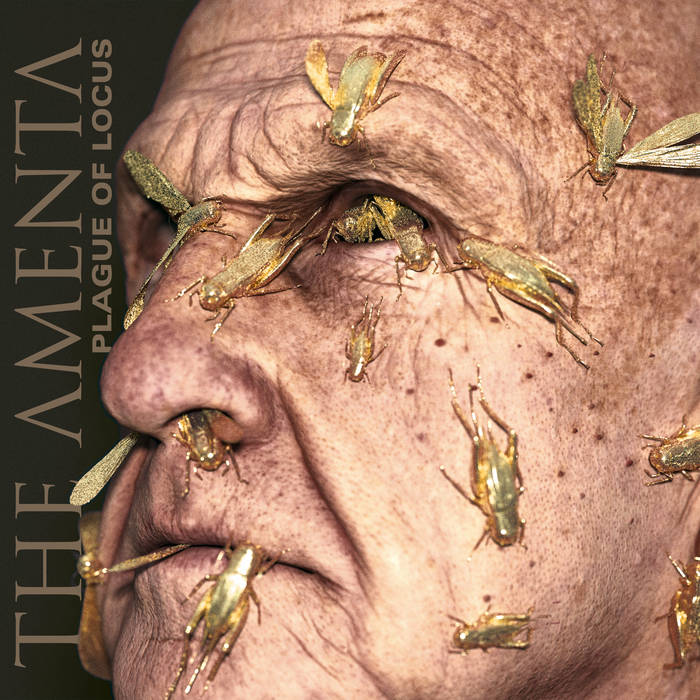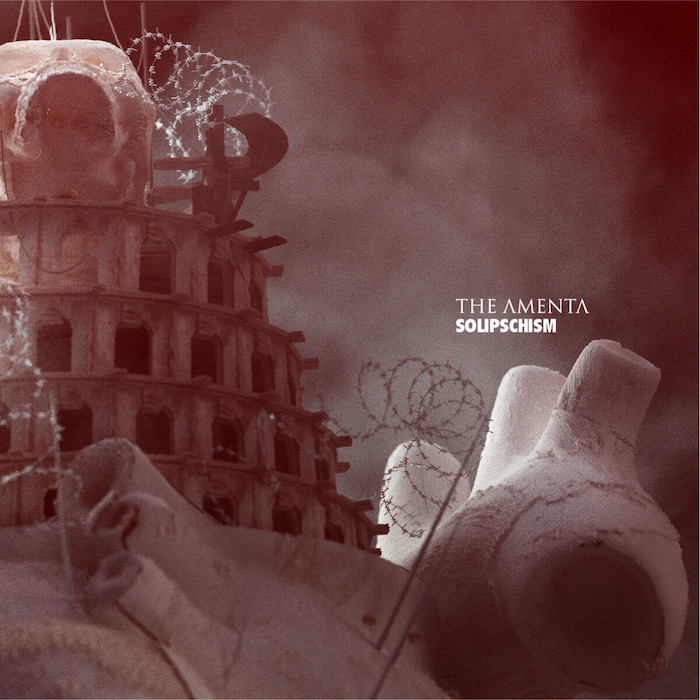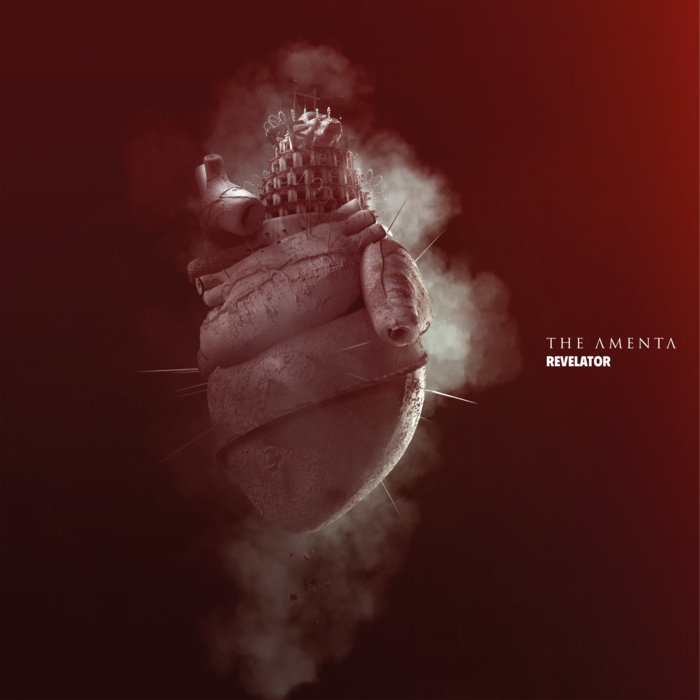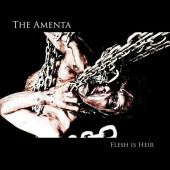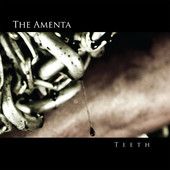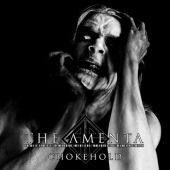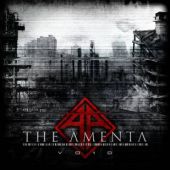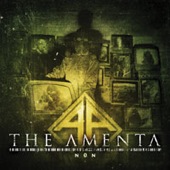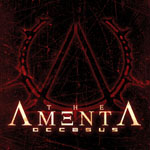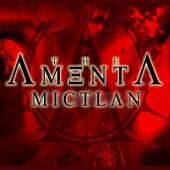The Amenta - Interview
In times of uncertainty and peril, the strangest and most unsettling music is what gives the most comfort. That's what I found with The Amenta's new album, anyway. A band that has always defied the expectations of industrial metal, they've gone a step further with their new release, "Revelator", and completely upended the foundation they built for themselves with their first three full-lengths. There's clearly a lot going on that can be dissected, and I had the opportunity to pick the brain of the creative forces behind this album - turns out they've got a lot to say. It's always a pleasure to converse with someone who's even more obtusely wordy than I am, so this may be one of my favorite interviews I've done yet. Read it below and get in the headspace of these weirdos for a bit.
Nathan
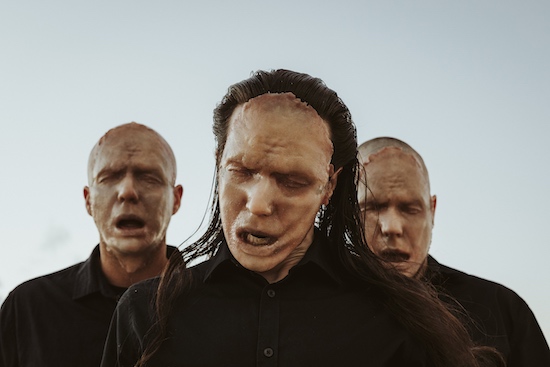
Thank you for taking the time to answer my questions! How's the pandemic been treating you down in Australia?
Timothy Pope: Thank you very much for the interview! Australia is quite lucky with the pandemic, I think. We're a very small population on a fucking huge landmass, so community transmission is more difficult than it is in a lot of other countries. We've had lockdowns and various restrictions but, overall, life has been normal for a while now. We can go to pubs as long as there is social distancing, for example. Not too many gigs happening yet but hopefully that will start to increase over the year. The only hard part is that part of the government's strategy to contain any cases is to close the borders between states. As the members of THE AMENTA all live in different states of Australia, that's caused some significant logistical challenges for filming video clips and the like but overall, looking at what's happening in other countries, I don't think we can complain too much!
Reading past interviews, it seems as though you guys have a commitment to reinventing your sound with each album. Tell us more about why this is crucial to understanding and appreciating The Amenta.
Timothy Pope: I think the re-invention is a fundamental aspect of THE AMENTA that makes us what we are. It's not a deliberate, thought out idea, where we decide to completely scrap everything we have and start again. It's more an effect of the process of how we write music. The basic driving factor behind all our music is an attempt to keep ourselves excited and inspired. When we're writing music it's usually a process of improvising around beats or riffs or whatever until we stumble over something that sounds new and exciting. If we get an idea that raises the hair on the back of our necks, then we are inspired to continue the idea and expand it. If we come up with ideas that feel like something we have said before, or doesn't add anything new to our music, the feeling is less excitement and more of a shrug. So those ideas end up being discarded because they aren't inspiring. As a result of this process, our albums are reactions against each other. Once we have recorded an album, repeating that sound just doesn't come naturally to us.
While our process is entirely insular, and based around keeping ourselves excited and entertained, I would hope that this "newness" also inspires listeners to the band. I know as a listener; I am much more likely to love an album that fucks with a band's formula than one that is a rework of an existing idea. Ideally, we'd like for people to avoid expectations when it comes to our music. There are certain bands who have somehow earned the "right" to explore their own path and their fans follow them, at least curious about new directions, and I hope that THE AMENTA can become one of those bands.
The most striking change about "Revelator" is that it's much more spacious and lets the atmosphere breathe, as opposed to the suffocating, overwhelming aesthetic of some of the earlier works. What inspired the band to move in this direction?
Timothy Pope: In some ways, that has always been part of THE AMENTA's arsenal. I think, in hindsight, tracks like 'Nihil' from Occasus or 'Skin' from n0n, for example have played with space and atmosphere more than blast but I think one of the main changes there is production. The mix on Revelator is the most open and organic I think we've had, and this foregrounds a lot more of the subtleties of the album. But of course, there are significant orchestration changes which is what you are referring to, I think.
This time around, the ideas that we got really excited about were the ones that tended to focus on the power of certain aspects. When you pull back a bit on tempo and allow riffs to find the "pocket" they can be significantly more powerful than if they are played at hyper speed. We were also interested in finding the "right" sounds for certain parts rather than overloading them with detail. This time it felt right to let sounds create an atmosphere of tension and unease rather than just fury and anger (though I think those aspects are also healthily represented!). It comes down, I think, to what I mentioned earlier. We've made albums that feel like they tear your head off. To do that again would be boring. There are certainly still aspects there, because we are at heart still the same angry, frustrated people we were in 2004, but it was the darker, more atmospheric sounds that excited us this time around. Next time, we'll possibly react against Revelator and try something new again. It's hard to predict what sounds will have that spark until we're in it, doing it.
Compared to The Amenta's back catalogue, "Revelator" is a much more varied album, and although you can still tell it's the same band it's arguably the most distinct album as well, with more melodic textures and themes. What were some other bands or artists you were listening to that inspired this new album while you were writing it?
Timothy Pope: I don't think we directly took anything consciously from other bands, but undoubtedly things slip in unconsciously. I can tell you a couple of key moments that I think probably had an effect on the album. Right when we started writing the album as THE AMENTA (as many of the songs were actually begun as a different project), Erik [Miehs, guitar] bought copies of the first two AKERCOCKE albums for us both, as a nod to our old selves. We were obsessed by that band, and those albums, when we were writing our first album, Occasus, so it was a kind of gesture to the idea that we wanted to recapture the spirit and excitement of those days. Throughout the recording process, Erik and I talked a lot about albums like the early Peaceville 3 albums that had a really compelling atmosphere. Also, the second Triptykon album got a lot of plays. We didn't consciously take anything from those albums but no doubt they seeped in. As a band, we have a huge variety of inspirations, that don't necessarily cross over. I think that if Cain [Cressall, vocals] told you his vocal inspirations, I mentioned my inspirations for keys and noise and Erik spoke about his inspirations for guitars you'd have three completely unrelated pools of inspiration. But somehow, when the three of us work on a sound, through what I consider an alchemical process, we turn those inspirations into something cohesive.
One other thing I appreciate is the ebb and flow between songs. Was this meant to be listened to as a concept album? Either way, tell us more about the lyrical themes behind "Revelator".
Timothy Pope: It's definitely supposed to hang together as an album. I think that's a very important thing to work towards, even currently where the playlist and single is king. However, it's not a concept album in a narrative sense. It doesn't follow a character throughout the songs at all. Like all our albums, I consider it a concept album in that all the songs are interrelated by theme and often even by lyrical fragments. Certain phrases appear and reappear throughout the songs, often slightly warped. The album is meant to be decoded as one complete "text", not broken down into a song by song understanding, so in that sense I see it as a concept album.
With that in mind though, the way I went about the lyrics for this album was a very different process that I have used in the past. Where I used to start with an idea or a theme and write around that, this time I wanted to bring my subconscious into play more. I wanted the themes to slowly form over the course of the writing rather than the other way around. Instead of starting with a theme, I carried around a book for many years. In this book I wrote phrases, often puns or plays on words as they occurred to me. These phrases tended to be based on my obsessions or thoughts I was thinking about at the time, and after some time became a "mental map" of my thinking of that time. Once I had written the phrases down I deliberately forgot the original meanings, as much as possible. When it came time to create sets of lyrics, I poured through the book to find phrases that, when juxtaposed, create a new tension or meaning. By following this tension and trying to add phrases that added to the overall feel I slowly built the lyrics. Because of this process, the lyrics have a master meaning, based on what the juxtaposition of the phrases meant to me at the time of collaging them, but they also contain within them, the seeds of the original ideas so certain images and phrases suggest counter-meanings or secondary meanings. The aim of the lyrics is to allow them to be interpreted by the listener. I see it as similar to what happens when you are presented with an abstract artwork. There are a lot of signs that suggest, but don't tell, meaning. It is up to the viewer to take those signs into their own mind and interpret them in a way that makes a meaning for them. I've tried to play with this in a couple of ways, not least that some of the lyrics are deliberately written to be misheard. There are three different ways of interpreting the lyrics: on paper (where you see "how" they are written), how they sound (and this is where the mishearing comes in, certain phrases hopefully sound like other phrases) and then the final is what they actually are in both sound and written, the "sung" lyrics (the "true" lyrics).
Because interpretation is key to the lyrical success in my mind, I don't want to break down my personal meanings. I know it is a lot to ask of a death metal fan to delve into lyrics, and I am sure that many will not do it, which is also fine. I have no desire to tell people how to enjoy our music. But I hope that, for those interested, the thicket of entangled themes and metaphors will act like a mirror. Because interpretation tells us more about ourselves than about what we are interpreting. It's our own obsessions and preconceived notions that shape the art, not the other way around. I hope that wasn't as exhausting to read as it was to write!
It's been eight years since you released "Flesh is Heir" in 2013, making this the longest gap between albums since the band's inception. Was there any specific reason for that, or just general writer's block and/or life getting in the way? What has the band been up to in the time in between?
Timothy Pope: After Flesh is Heir, which was a long and arduous process to finish, we jumped immediately into touring and played many, many shows. After those shows, and that intense recording, we were completely burnt out. Our band runs on inspiration. It's the key fuel, we have to be excited about the next thing. When we were burnt out, we knew that recording a new album would result in a rehash of things we had done before and, to us, that's abhorrent. When there is no fuel in the tank, it's not possible to be inspired. We made the decision to disappear for as long as it took to have something new and inspiring to say. At that point, we weren't sure if that would ever happen. There was a very real chance that we would hang up our filthy, sweat stained stage gear and slip away.
After a little break, we got that urge again but we came at it from a sideways direction. We've tried this technique in the past, between Occasus and n0n and it works well for us to discover the new thing. Our technique is to trick ourselves into writing something new by starting a new project. A new project has no history, no expectation, and nothing to live up to. This time we started writing for something that wasn't going to be THE AMENTA. I think we wrote something like 10 songs of rough ideas, all very different and inspiring to us. But, as happened the last time, we started thinking about the songs and whether they could be songs for THE AMENTA. Almost immediately it felt right to change over, and these songs were sorted through to find the key ideas, which were then re-imagined as tracks for THE AMENTA. We began writing and recording the album in 2016 or so, however life did slow things down. People had kids, moved countries and general life fuckery slowed things down. I think the fact that we were out of a recording contract and no one was waiting for the album to be delivered also slowed things down. We didn't allow ourselves to rush to meet a deadline, which was a blessing as it allowed us to really see through all our ideas, but a curse in the time it took between releases. Hopefully we can turn around the next one in under 8 years!
I'm interested in the writing process behind "Revelator", especially because of how detailed and unique the keys and ambient soundscapes are. Tell me more about how that goes - is one of you the primary songwriter, and how do you shape and mold the initial ideas and concepts that you bring into the band? Do you write guitars first? Lyrics? Keys?
Timothy Pope: The creative core of the band is Erik, Cain and me. Who does what tends to overlap in a lot of ways, however the basis of the songs usually comes from either Erik, me, or more often Erik and me together. There's no set rule of how songs start but there is generally a common process that we follow to develop ideas. Someone might have a concept, like "post-punk style beat" which we then program and then improvise a bass line over. That was how 'Parasight Lost' started. Other times it's a guitar riff. The main verse riff from 'Sere Money' came from an improvisation that Erik had recorded one day before I turned up at his place to write. He had pressed 'record' and just mucked around on the guitar, trying things. The first thing we did that day was listen back and pick out any bits that could be developed. That riff jumped out immediately. With all of our songs, once that initial idea is in place, we improvise different parts or improvise the next section. The process is all about finding the ideas that spark an excitement, which is how we end up re-inventing ourselves. Erik and I usually put together the "skeleton" of a song, which is a rough structure with enough instrumentation to get the idea of what's going to happen across. That usually consist of drum machine, one guitar part, a few select keyboard and effects parts and occasional bass lines. Basically, any part where someone had an idea of what it "could" do, gets quickly thrown down.
While that process is happening the lyrics as written on the side, they aren't written to an actual song, as our songs will change significantly from that point. Cain then takes the lyrics and the skeletons and begins demoing ideas. This is where the songs really go through the alchemical changes I spoke about. From Cain's demos, we can hear changes in the structure that would improve the song. Cain's process also allows us to refine the lyrics, as they are reworked to fit parts, often whole chunks are discarded, or new parts written. Once we have solid demos of Cain's parts over the skeletons, and the structures are relatively solid, we begin filling in the meat on the bones of the skeleton. For this album, this was when David [Haley, drums] recorded his drum parts and we began the process of recording the album, which is the same as the process of orchestrating it. We all work in our home studios, bouncing ideas out, comparing new parts and ideas. All three of us have a say in what works and what doesn't. Gradually the songs are built up into a basic idea of the final form. At this stage structural changes still take place. Finally, it comes to the mixing stage and things go through a dramatic stage of getting fucked up. Erik mixed the album and one of the techniques he used, which has been a staple of the band since the early days, is to run everything through different effects, treating the original songs like fodder for otherworldly sounds. It's a similar process to a dub mix. For Revelator almost everything (vocals, guitars, keyboards, bass, drums) at some point was fed through a chain of guitar pedals. Erik has the unenviable task of pulling the original tracks, and these new affected "atmosphere" tracks into something resembling cohesion. We think he did a stellar job.
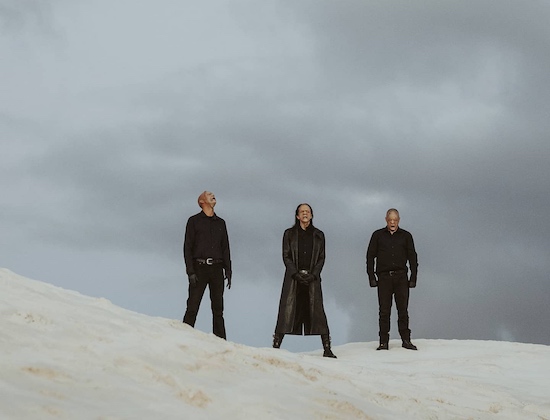
The vocal performance on this album is very distinct, with a lot of different styles of shrieks, yells, and clean singing used. More a question for Cain specifically, tell me more about your main influences and inspirations vocally.
Cain Cressall: I look for inspiration anywhere and everywhere. I grew up with quite a broad spectrum of music around me, thanks to my parents. A lot of 60s, 70s, 80s stuff. Largely, American, British and Australian artists. I guess you could say I was raised on rock. Blues rock, pop-rock, prog rock, the works. A lot of gutsy, uncompromising bands with no shortage of attitude. Most of those bands have remained a staple part of my musical diet to this day. To whittle down my vocal heroes to a list of "main" influences and inspirations would be impossible. Even to look specifically at Revelator, to determine my most relevant influences, would be folly. I respond to the music I'm working with, and I draw from an ocean of musicians, many of which I've been studying intensely since I was a kid. Most of my biggest heroes are not from the world of metal, save for a handful.
AC/DC, Alice Cooper and Whitesnake were the first bands to make me completely obsessed with music... Studying music.... Learning and memorizing lyrics, vocal patterns and melodies. I was in the fifth grade, and discovered a 3hr video tape, crammed with shitloads of various music videos my Dad had recorded from TV. Once I was obsessed, these bands were followed pretty rapidly by Black Sabbath, Deep Purple, Led Zeppelin, Jimi Hendrix, Journey, Mountain, Uriah Heep, etc, etc. Once those first few music videos got me hooked, I went about investigating all the other shit my parents had been listening to during the years prior. I had a lot of catching up to do, and I didn't waste any time! I actually took a lot of inspiration from Mel Blanc who did the voices for the majority of the most memorable Looney Tunes characters. His vocal range was huge, and there was no end to the tones and textures he would experiment with. Screaming, howling, shrieking, blubbering, shouting, snickering, wailing… There was no limit to his range of character and expression. I used to love mimicking lines from all my favourite cartoons, trying to figure out how he manipulated his voice to manage all those sounds! I'm always listening out for interesting vocal dynamics, whether it's in cartoons, film or music. Many of my biggest lessons have come through studying female vocalists. My Mum played a lot of Janis Joplin around the house, when I was growing up, who was an absolute powerhouse of deeply emotive, vocal expression. Johnette Napolitano is a massive one for me. I could rattle on forever with names of singers who have been absolute game changers for me. Even in pop music. Despite the wide variety of garbage out there, some vocalists in the pop world have even made my head spin, ending up on regular rotation at home. There are so many brilliant, innovative vocal geniuses out there, and I have no interest in limiting myself to any handful of genres. All this stuff gets loaded into my musical palette, and most of it comes through subconsciously. I'm simply responding to music and drawing on a variety of tools to compliment that music.
The Amenta has a distinct aesthetic, creepy in an abstract sort of way, very "metal" feeling without having the typical look of other metal bands. How important is the visual presentation of The Amenta in understanding the full package and what sort of image are you trying to convey?
Cain Cressall: Yes, the visual representation has always been a hugely important factor in the band, going back to the first album. This is one of the reasons I was sought out to join THE AMENTA, and one of the reasons it felt so right to get onboard. We're all passionate performers and dark artists, as well as songwriters and musicians. There's something about being completely submerged in extreme music; Being a willing participant in an all-out assault on the senses. There's something about being swept up in, not only the music itself, but a potent, dynamic and expressive performance. This is something that has always resonated deeply with all of us as fans of extreme music, and it's part of our calling. That said, it's also something that must change to reflect the music as that evolves. Otherwise, the visual aesthetic is no longer true to the sound and sentiment of the music.
As for what I was trying to convey with the Revelator photography and music videos, most of it was subconsciously generated imagery, which I only started unpacking later in the process. That's not to say it's completely random, as I was very conscious of dismissing anything that did not support the feel of the music. Some of it ties in with the lyrics. Some of it is far more personal. The imagery I was looking for was, first and foremost, to compliment the sound. These images revolve largely around the transmutation of suffering, which can occur through any number of pathways. One way we do that is through art and music. We wring out the collective juices of our life experience into something new and tangible which we hope to bring about cathartic response in the observer. Sometimes, the further and harder we dig, trying to make sense of life, the more confused and lost we become. I guess I'm trying to highlight the beauty and majesty of life's challenging twists and turns. The wonder of the dark, suffocating caverns we can find ourselves in along our journey. Stripping away layers of who we think we are, only to find new questions and challenges underneath them.
Since touring looks a little different right now (especially on a worldwide scale) and you can't really go hit the road to get this album out there, did you have any hesitations releasing it during a pandemic?
Timothy Pope: We were well into the process of finalizing the album, it was half mixed, before this pandemic hit so initially it wasn't a concern. As we started looking at how we were going to release it, it did cross our mind that it may not be the best time. But by that time, we had spent so long on the album, and had so much emotionally invested in it, that holding it back just felt wrong. Personally, I would rather get it out, however it is received, so we can move on and start working on the next thing. We're hoping that we can do some shows locally, things were at one point looking pretty positive here, but it changes overnight so who knows. One cool thing is that it seems that people haven't stopped buying music. In fact, David, our drummer, runs an Australian merch site (direct-merch.com) and he is selling huge amounts of physical media as well as merch. So that may be a blessing in disguise. People can't leave their homes so they are buying entertainment.
Any plans for live streaming shows, or touring Europe/North America once you can do so? Would love the chance to see you up here in Canada.
Timothy Pope: There's nothing yet planned but we are definitely keen to tour in Europe and North America as soon as we can. For live streaming shows, we have made it difficult for ourselves by all living in different states of Australia. Our bass player Dan [Quinlan] lives in L.A., the rest of us live in Australia but many thousand of kilometers apart. Cain and I live on opposing sides of the country, for example, which is 4,000 kilometers between us. While Australia is relatively stable compared to the rest of the world in this pandemic, we still have regular closures of state borders. So getting us all in the same room isn't possible at the moment without the potential risk of being locked out of our home states, away from families and work. But if we can tour locally, we will film and record the show, as we always do for Australian live shows, and try to make that into something that international people can view so we can at least have some live representation of the album.
If you could pick any band to tour with The Amenta (active or not, any time period) Who would it be and why?
Timothy Pope: My pick would be EINSTURZENDE NEUBAUTEN. I've never seen them live, despite being a huge fan, because I am allergic to crowds, but I would love to see them. And most importantly, I'd love to stand side of stage to see how it is all done. The way that band can pull elegant, beautiful music from power tools and scrap metal is incredible. Imagine seeing that every night!
Which member of The Amenta is the most skilled at cooking and who is the least skilled?
Timothy Pope: Other than to say it is sure as shit not me, I am not certain who would be the best. We're not the kind of band that gets together for big spaghetti dinners or barbeques. When we get together it is about two things: extreme music and booze. We like to go out for dinner and drink and eat stupid things, but we aren't the kind of civilized band who cook for each other. If I had to guess, I would say Erik is the best cook because he HAS cooked me a meal or two over the years. Makes a mean toasted sandwich. Cain may have cooked some sausages on the barbeque at one time for us when we stayed at his house before he was in the band though. I will say I am the worst, and they are the tied best.
Where can fans listen to and/or buy your new album?
Timothy Pope: One of the best places to listen to and buy the album is Bandcamp. Bandcamp rules and allows people to support bands directly. Much better than other streaming services. On our Bandcamp site (https://theamenta1.bandcamp.com/) you can stream the album as well as buy CDs, LPs, tapes, buttons and pins. You can also buy the album from the Debemur Morti Europe and US stores, IndieMerch also stocks in the US, and then we have two Australian stores, Nerve Gas and Direct Merch.
Thank you again for answering these questions. The last words are yours if you have anything else to say.
Timothy Pope: Thanks very much for the interview (and the killer review I saw today)! We're really keen to hear what people think of this new album. It's definitely different, and it will most certainly challenge some people, but I think it is the ugliest and darkest release of ours to date. I encourage anyone reading this with a taste for the nasty to check it out. It's a filthy piece of work.
Discography
Upcoming Releases
- Morrath - Obscure Abominations - Feb 25
- Chalice - Divine Spear - Feb 27
- Blackwater Drowning - Obscure Sorrows - Feb 27
- Vide - Aux Enfants Des Ruines - Feb 27
- The Leaving - The Leaving - Mar 06
- Serpent Icon - Tombstone Stories - Mar 06
- Insect Inside - Reborn In Blight - Mar 06
- Triumpher - Piercing The Heart Of The World - Mar 06
- Lömsk - Act II - Of Iron And Blood - Mar 06
- Monstrosity - Screams From Beneath The Surface - Mar 13
- Against I - Anti Life - Mar 13
- Empire Of Disease - While Everything Collapses - Mar 19
- Putred - Blestemul Din Adânc - Mar 20
- Gaerea - Loss - Mar 20
- Diatribes - Degenerate - Mar 20
- Zerre - Rotting On A Golden Throne - Mar 27
- Foetorem - Incongruous Forms Of Evergrowing Rot - Mar 27
- Cryptworm - Infectious Pathological Waste - Mar 27
- Antrisch - Expedition III: Renitenzpfad - Mar 27
- Cruel Force - Haneda - Mar 27

